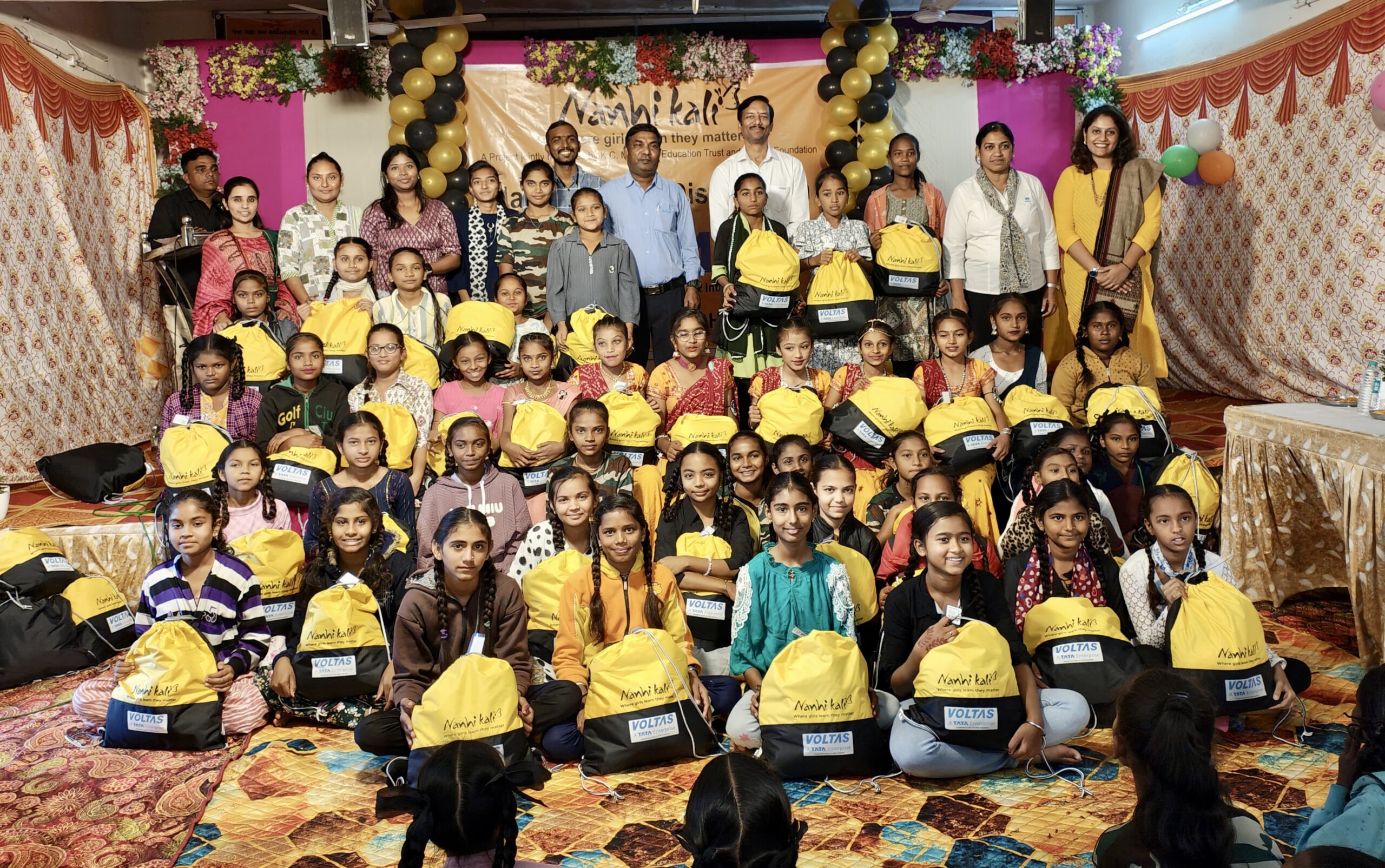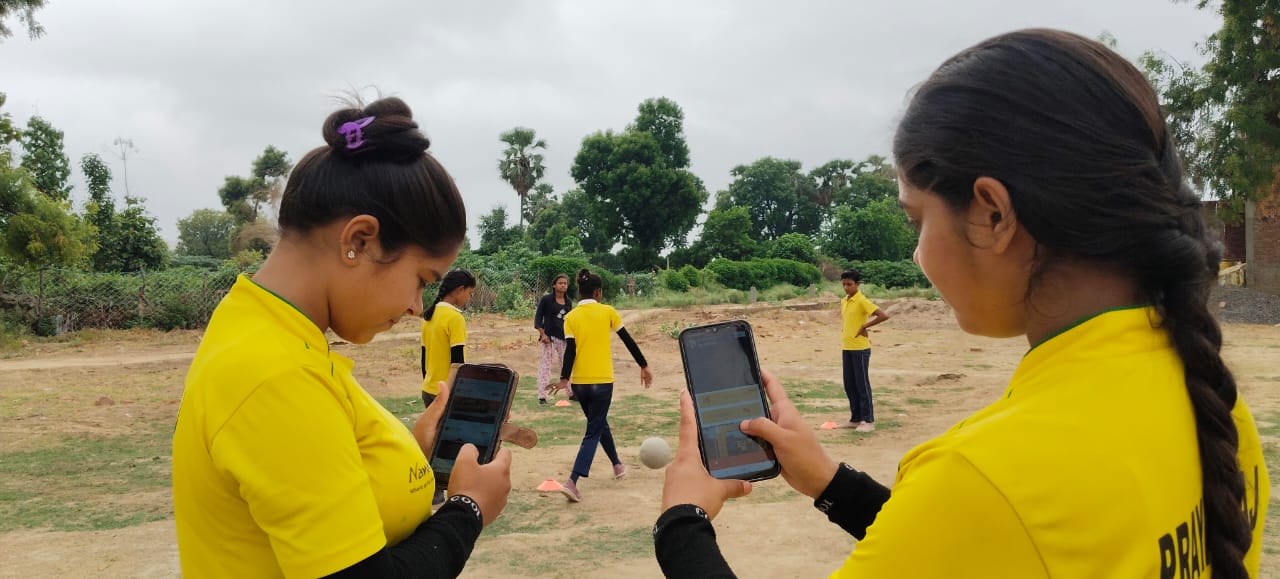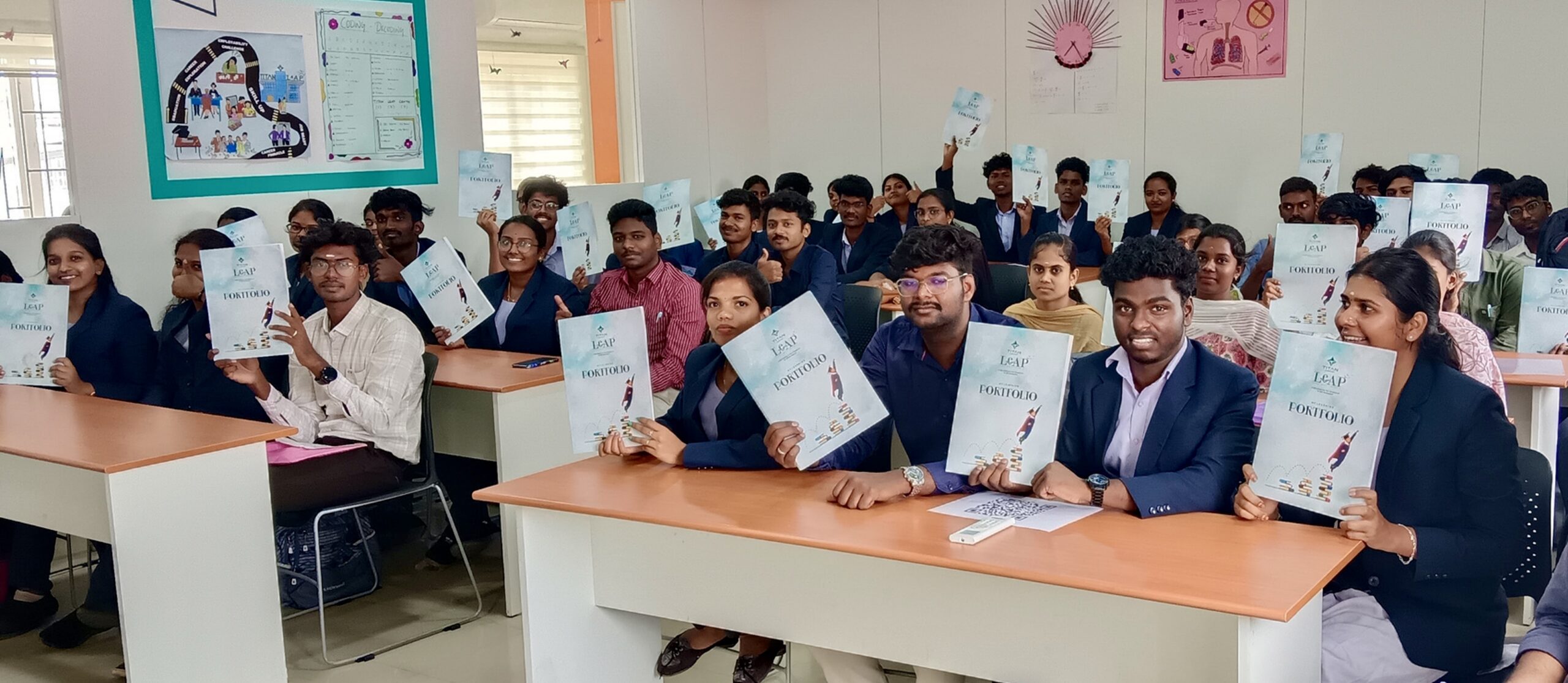Each year, as new girls join the nationwide community of 171,000 girls under the wings of Project Nanhi Kali, drawstring bags in Nanhi Kali’s unmistakable canary-yellow soon arrive at their sides. Each bag and the six items packed inside it make up what we call a Nanhi Kali Kit: a carefully chosen set of schooling, sports, and personal items that help each Nanhi Kali meet the demands of her day—attending school, assimilating 21st-century skills, exercising, managing her period, playing sports, and gaining leadership skills. Support and mentorship in managing these diverse spheres of learning are provided by the Skills Associates of the Nanhi Kali programme, who interact with Nanhi Kalis on a daily basis.
The Kit’s drawstring bag is sturdy and spacious, filled with items that few girls in disadvantaged households would otherwise have: a pair of sports shoes, two sports t-shirts, two pairs of socks, a fresh notebook, two pens, and 14 packs (a year’s supply) of feminine hygiene products. Receiving this kit is a significant moment for each Nanhi Kali. Whatever her age, or whether she is joining new or continuing in the programme, we hope the moment serves as a reminder, an assurance, that she is seen, supported, and equipped to grow—capable of excelling not just academically, but as part of a collective of girls across 19 locations in 7 states who are connected to each other through their gaining 21st-century skills, physical literacy, and confidence to lead so that they may thrive and step into futures of their own making.
Long before the kit reaches a Nanhi Kali, an efficient production-line choreography unfolds between several players within the Nanhi Kali ecosystem and their trusted vendors. High-quality items for approximately 171,000 kits must be designed and ordered, keeping in mind that they must be durable and enjoyable – items the girls will be proud to carry and use. Consider the size of these orders too: 171,000 drawstring bags, shoes, and notebooks, double that number of t-shirts, socks, and pens, and nearly 2.4 million feminine hygiene packs! And some sponsors even request that their names be printed on the drawstring bags, adding another layer of complexity of customisation to that order. Once produced, ordered, and received from vendors, the items that make up each kit must be packed correctly, keeping in mind each girl’s specific sizes for sports gear, and then delivered in time to girls spread across thousands of villages and towns.
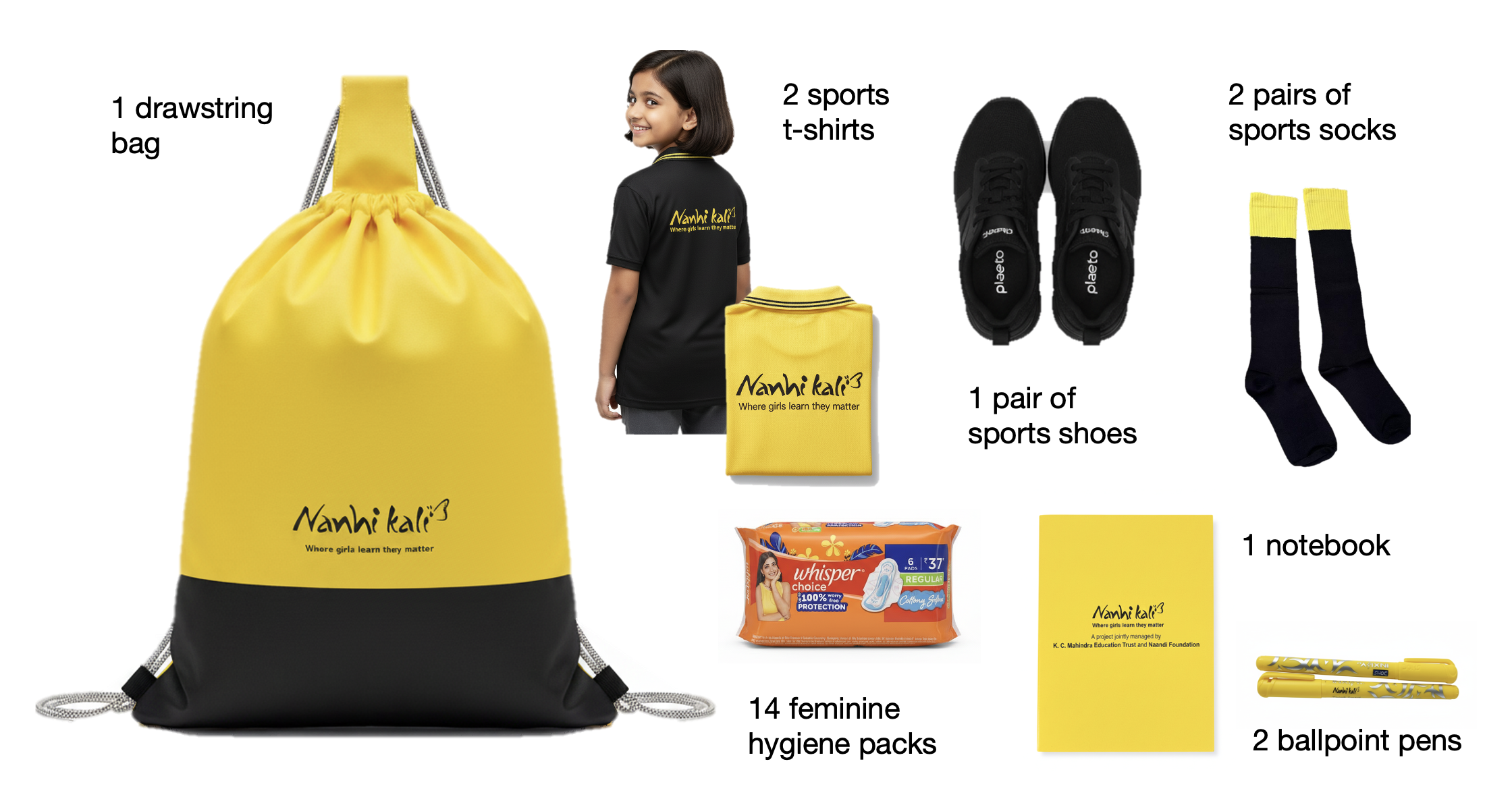
At the 32,000-square-foot central warehouse in Hyderabad, the magic of this logistical operation comes into full swing. A 70-member team—about half of them women—unloads, checks, sorts, and stores the goods before assembling the kits in waves. In a single day, as many as three to five thousand kits can be prepared. Around the strap of each drawstring bag, a QR code is tied—digitally linking the kit to the girl it is made for, its contents, and its destination. This system is a recent innovation, replacing the manual registers of earlier years. Now, when Skilling Associates scan the QR code on each kit, our teams are instantly notified—confirming that the girl has received her kit, complete with shoes that fit her stride, t-shirts in her size, a year’s supply of feminine hygiene products, and her own notebook and pens.
Once packed in Hyderabad, bulk packages of kits set off by container trucks on long journeys across the country—sometimes traveling more than 2,200 kilometers north to Darjeeling in West Bengal, or 630 kilometers south to Chennai in Tamil Nadu. Truck drivers are given route maps to follow, with several delivery stops: town and village schools where the Skilling Associates, who work daily with the girls, along with some parents and the school’s principal, will be waiting to receive and hand over each kit to the girl it was packed for. Sometimes, donors of the Nanhi Kali programme are present on these distribution days, treating them as ceremonies and opportunities to meet the girls and see what the programme is providing.
After 20 years, this vast, complex exercise has become an annual ritual of care. The whole process, from designing and ordering items to sorting, storing, and packing them into individual kits, reminds us that each girl is special and deserving of something that has been made with her in mind.
When she finally receives her Kit, it may serve as an important moment of validation. A reassurance that her schooling is not—and should not be—an afterthought. That she has the same right to a pen, to a pair of shoes, to comfort and dignity during her period, as does any other girl in the world. Almost immediately, she will start making use of these items: filling notebooks with notes from her lessons, doodles, or fragments of her growing voice—nurtured further through the Nanhi Kali modules in critical thinking and communication. Her shoes will soon wear softer, the outsoles thinning on football fields and running tracks, as she learns to sprint, compete, and play as part of a team.
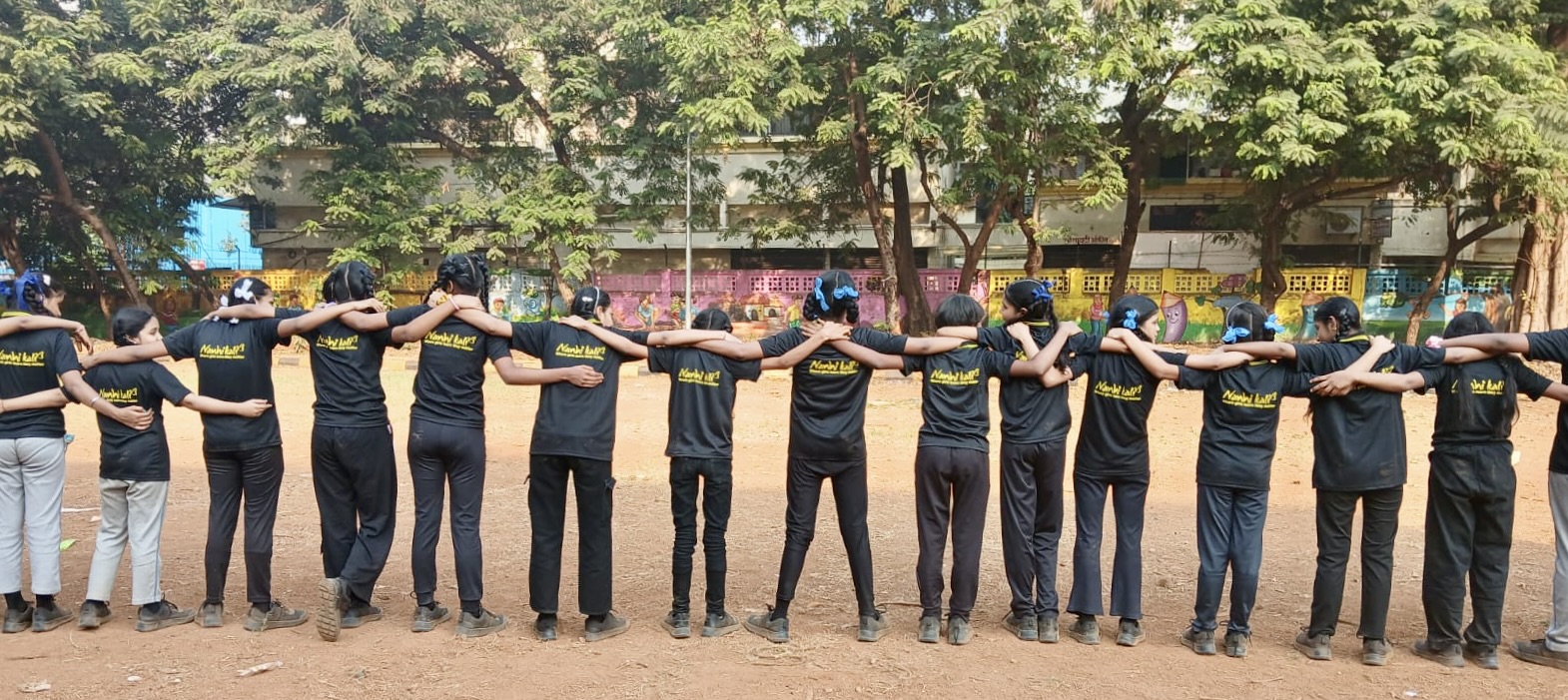
At home, the kit benefits and speaks in subtler ways. It saves parents of the girls money and reassures any who may question the value of education or the importance of schooling their daughter. It sparks curiosity in younger siblings who imagine themselves, one day, carrying the same bright yellow bag as a Nanhi Kali. And for the girl herself, it lingers faithfully by her side across many moments, as a symbol of her being a Nanhi Kali, prepared for her lessons, her periods, her days of studying and sports, and her future.
The Nanhi Kali Kit may appear ordinary on the outside, yet for the girls who carry and use it every day, it becomes something else entirely: a bright yellow item that links her to 171,000 girls at present, and 600,000 more who have completed the programme. It helps her cross thresholds—into classrooms, onto sports fields, and eventually into futures she and her family may never have imagined before.


